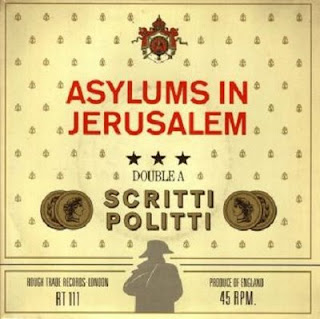VANESSA ELLISON (Pylon singer): During the summer, we were lining up shows in New York thanks to the wild success of The B-52's that year with "Rock Lobster".
The B-52's - Rock Lobster 1978
GLENN O'BRIEN (Journalist/Mudd Club dj): August Darnell of Kid Creole & The Coconuts had this vision that was very exotic. He thought that was the future of music - this exotic blend, sort of world music. To me, their stuff seems so modern, especially that "Que Pasa/Me No Pop I" record that Andy Hernandez from the Coconuts made as Coati Mundi.
Coati Mundi - Que Pasa/Me No Pop I 1981
MICHAEL ZILKHA (Co-founder of ZE Records): When I first heard the debut single from Was (Not Was) "Wheel Me Out" I though that was much more than merely 'clever'. David Was was really out there.
Was (Not Was) - Wheel Me Out 1980
MICHAEL ZILKHA (Co-founder of ZE Records): With Material's "Bustin' Out", I wanted them to make a record with a disco beat and be as strange as they wanted on top. I wanted lots of heavy-metal guitar - this is way before Michael Jackson's "Beat It". They used Black Panther George Jackson's prison letters as the text and got Nona Hendryx to sing it. And they delivered exactly what I'd wanted. It was a cynical, manufactured record.
Material with Nona Hendryx - Bustin' Out 1981
PAT PLACE (Bush Tetras vocalist): I was sitting at my job at Bleecker Street Cinema when I jotted down those lyrics for "Too Many Creeps". The people on the streets were bugging me.
Bush Tetras - Too Many Creeps 1980
VIVIEN GOLDMAN (journalist/musician): I was friends with PiL and recorded the single "Launderette" in down time at the Manor studio when they were doing Flowers of Romance.
Vivien Goldman - Launderette 1981
RICHARD MCGUIRE (Liquid Liquid guitarist): I read that Afrika Bambaataa was playing Liquid Liquid's "Cavern" at the Roxy which is where [Grandmaster Flash] apparently heard it...When Flash appropriated "Cavern" for "White Lines" it was a mixed bag. Here's somebody you're in awe of, so it's a compliment.
Liquid Liquid - Cavern 1983
Grandmaster Flash and the Furious Five - White Lines 1983
RENEE SCROGGINS (ESG vocalist): With Martin Hannett we did "Moody", "UFO" and "You're No Good", which are now the 'classic' ESG songs.
ESG - Moody 1981
ESG - UFO 1981
ESG - You're No Good 1981
STEVEN MORRIS (New Order drummer): "Everything's Gone Green", that was when New Order found a direction again. That was the beginning of bringing the drum machine in and pressing the start button.
New Order - Everything's Gone Green 1981
PETER HOOK (New Order bassist): [Factory Records's New York representative] Michael Shamberg suggested that we work with Arthur Baker, because Arthur was really happening with [Rockers Revenge's] "Walking on Sunshine" and [Freeez's] "I.O.U.".
Rockers Revenge - Walking on Sunshine 1982
Freeez - I.O.U. 1983
BARNEY SUMNER (New Order vocalist): Arthur was working on Freeez at the same time which is probably why ["Confusion"] sounds similar.
New Order - Confusion 1983


























